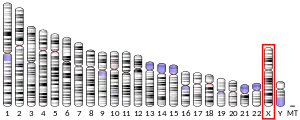Zinc finger protein 41 is a protein that in humans is encoded by the ZNF41 gene.[3][4]
This gene product is a likely zinc finger family transcription factor. It contains KRAB-A and KRAB-B domains that act as transcriptional repressors in related proteins, and multiple zinc finger DNA binding motifs and finger linking regions characteristic of the Kruppel family. This gene is part of a gene cluster on chromosome Xp11.23. Several alternatively spliced transcript variants have been described, however, the full-length nature of only some of them is known.[4]
References
- 1 2 3 GRCh38: Ensembl release 89: ENSG00000147124 - Ensembl, May 2017
- ↑ "Human PubMed Reference:". National Center for Biotechnology Information, U.S. National Library of Medicine.
- ↑ Franze A, Archidiacono N, Rocchi M, Marino M, Grimaldi G (Jul 1991). "Isolation and expression analysis of a human zinc finger gene (ZNF41) located on the short arm of the X chromosome". Genomics. 9 (4): 728–36. doi:10.1016/0888-7543(91)90367-N. PMID 2037297.
- 1 2 "Entrez Gene: ZNF41 zinc finger protein 41".
Further reading
- Rosati M, Marino M, Franzè A, et al. (1991). "Members of the zinc finger protein gene family sharing a conserved N-terminal module". Nucleic Acids Res. 19 (20): 5661–7. doi:10.1093/nar/19.20.5661. PMC 328972. PMID 1945843.
- Knight JC, Grimaldi G, Thiesen HJ, et al. (1994). "Clustered organization of Krüppel zinc-finger genes at Xp11.23, flanking a translocation breakpoint at OATL1: a physical map with locus assignments for ZNF21, ZNF41, ZNF81, and ELK1". Genomics. 21 (1): 180–7. doi:10.1006/geno.1994.1240. PMID 8088786.
- Rosati M, Franzé A, Matarazzo MR, Grimaldi G (1999). "Coding region intron/exon organization, alternative splicing, and X-chromosome inactivation of the KRAB/FPB-domain-containing human zinc finger gene ZNF41". Cytogenet. Cell Genet. 85 (3–4): 291–6. doi:10.1159/000015315. PMID 10449920. S2CID 26777065.
- Strausberg RL, Feingold EA, Grouse LH, et al. (2003). "Generation and initial analysis of more than 15,000 full-length human and mouse cDNA sequences". Proc. Natl. Acad. Sci. U.S.A. 99 (26): 16899–903. Bibcode:2002PNAS...9916899M. doi:10.1073/pnas.242603899. PMC 139241. PMID 12477932.
- Shoichet SA, Hoffmann K, Menzel C, et al. (2004). "Mutations in the ZNF41 gene are associated with cognitive deficits: identification of a new candidate for X-linked mental retardation". Am. J. Hum. Genet. 73 (6): 1341–54. doi:10.1086/380309. PMC 1180399. PMID 14628291.
- Colland F, Jacq X, Trouplin V, et al. (2004). "Functional proteomics mapping of a human signaling pathway". Genome Res. 14 (7): 1324–32. doi:10.1101/gr.2334104. PMC 442148. PMID 15231748.
- Gerhard DS, Wagner L, Feingold EA, et al. (2004). "The status, quality, and expansion of the NIH full-length cDNA project: the Mammalian Gene Collection (MGC)". Genome Res. 14 (10B): 2121–7. doi:10.1101/gr.2596504. PMC 528928. PMID 15489334.
- Ross MT, Grafham DV, Coffey AJ, et al. (2005). "The DNA sequence of the human X chromosome". Nature. 434 (7031): 325–37. Bibcode:2005Natur.434..325R. doi:10.1038/nature03440. PMC 2665286. PMID 15772651.
External links
- ZNF41+protein,+human at the U.S. National Library of Medicine Medical Subject Headings (MeSH)
This article incorporates text from the United States National Library of Medicine, which is in the public domain.
This article is issued from Wikipedia. The text is licensed under Creative Commons - Attribution - Sharealike. Additional terms may apply for the media files.


